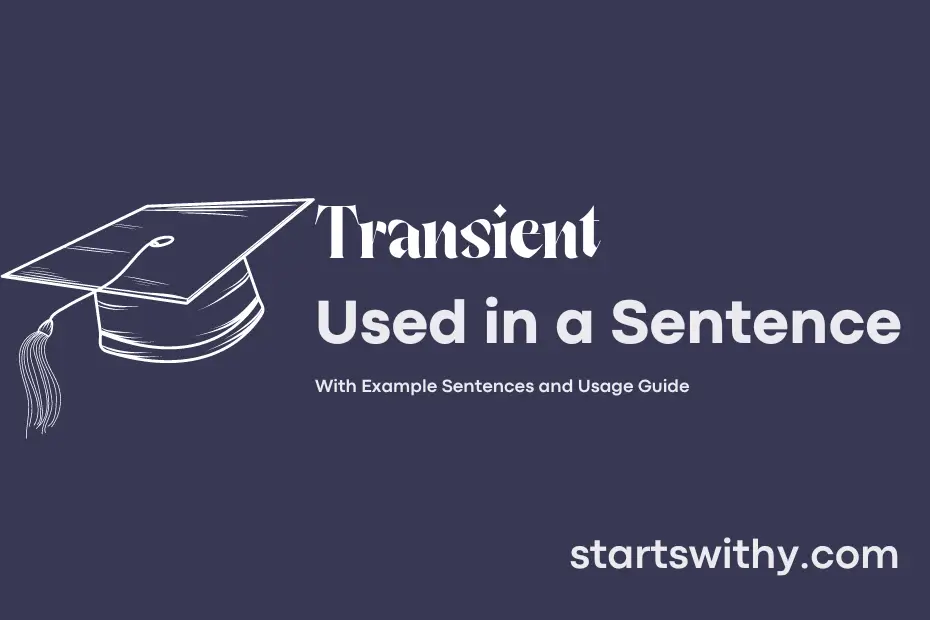Do you ever struggle to remember the meaning of the word “transient”? Let’s clear that up for you. In essence, “transient” refers to something that is temporary or fleeting in nature.
When we talk about something being transient, it means that it is not permanent and will not last long. This term can be used to describe various things, such as feelings, conditions, or experiences.
7 Examples Of Transient Used In a Sentence For Kids
- Transient means something that does not stay for a long time.
- My friend saw a beautiful butterfly, but it was transient and flew away quickly.
- The clouds in the sky were transient, they kept moving and changing shapes.
- The shooting star was transient, it appeared for only a few seconds in the sky.
- The water in the river is transient, it keeps flowing and never stays still.
- The flash of lightning was transient, it lit up the sky for a moment and then disappeared.
- The scent of the flower was transient, it faded away after a short while.
14 Sentences with Transient Examples
- Transient friendships are common in college, as people come and go frequently.
- It’s important to remember that stress is transient and will pass, especially during exam season.
- College life can feel transient at times, with new experiences and challenges every day.
- It’s normal to feel a sense of transient loneliness when adjusting to college life in a new city.
- The feeling of excitement at the beginning of a new semester is often transient and fades as assignments pile up.
- Enjoy the transient freedom of college life, as it won’t last forever.
- The transient nature of college relationships can be both exciting and challenging.
- Don’t let setbacks discourage you, they are often transient obstacles in your path to success.
- The feeling of homesickness for some students can be transient as they settle into their new environment.
- Embrace the transient opportunities that come your way during your college years.
- The sense of independence you feel in college can be transient as you navigate your way through different phases of your life.
- Remember that bad grades are transient, but the lessons you learn from them are invaluable.
- The transient nature of college parties often leads to unforgettable memories with friends.
- Cherish the transient moments of joy and relaxation in between your busy college schedule.
How To Use Transient in Sentences?
Transient is a key word that is often used in various contexts in the English language. Transient is an adjective that describes something temporary, brief, or passing. In order to use transient in a sentence correctly, you can follow these simple steps:
-
Identify the context: Determine if you are referring to something that is short-lived, impermanent, or not lasting for a long time.
-
Choose the subject: Select the noun or pronoun that you want to describe as transient.
-
Place transient in the sentence: Position the word transient before the noun or pronoun to indicate that it is temporary or fleeting.
For example:
– The beauty of the sunset was transient, disappearing quickly behind the mountains.
– The happiness she felt was transient, as it soon turned into sorrow.
– The joy of receiving the gift was transient, overshadowed by the realization that it was broken.
By following these steps, you can effectively incorporate transient into your sentences with ease. Remember that transient is a versatile word that can be used to convey the idea of transience or impermanence in a clear and concise manner.
Conclusion
In conclusion, transient sentences are brief and passing in nature, conveying information or emotions succinctly. While they may lack depth, their brevity can make them impactful by capturing a moment or feeling with clarity. These sentences are like fleeting glimpses, leaving a lasting impression despite their fleeting presence.
By using transient sentences, writers can add variety and rhythm to their prose, allowing for moments of reflection or emphasis within a larger piece of writing. Their concise nature can also help to convey urgency or immediacy in storytelling, keeping readers engaged and moving the narrative forward. In essence, transient sentences serve as punctuation marks in a narrative, punctuating its flow and providing moments of pause or intensity.



